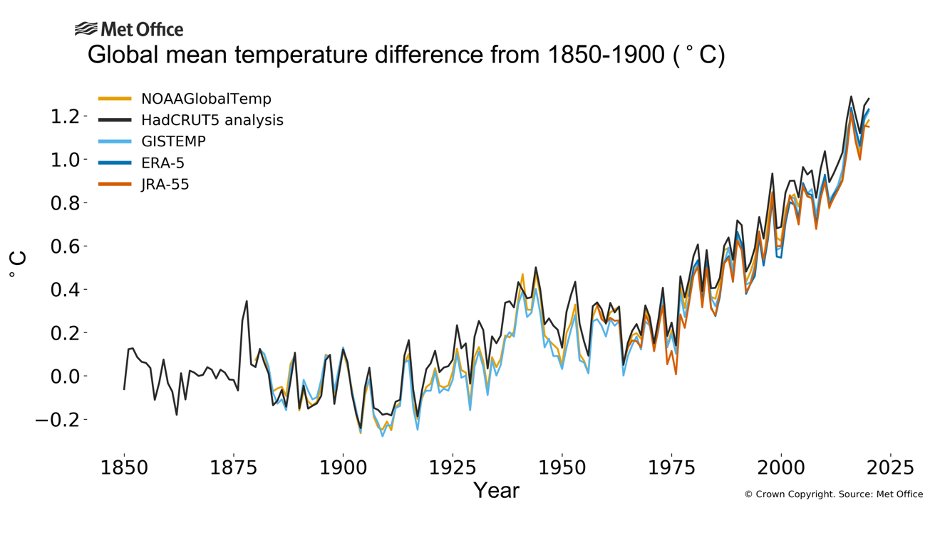- Aug 8, 2012
- 6,493
- 7,692
- 77
- Country
- Australia
- Gender
- Male
- Faith
- Atheist
- Marital Status
- Divorced
2020 Confirmed As One Of Earth's Warmest Years On Record
BEN DOMENSINO, 15 JANUARY 2021
Newly released figures from five world-leading datasets has confirmed that 2020 was one of our planet's three warmest years on record.
The World Meteorological Organization (WMO) has combined data from five separate datasets to come up with a single figure that represents how much our global temperature has changed relative to the pre-industrial level.
According to the WMO, "The average global temperature in 2020 was about 14.9°C, 1.2 (± 0.1) °C above the pre-industrial (1850-1900) level".
This figure, which combines both land and ocean surface temperatures, was produced using datasets from:

Image: Global mean temperature anomalies from five the datasets used by the WMO. Source: WMO / Met Office
All five of these global datasets individually place 2020 among the three warmest years on record globally. They also all rank the past decade as our planet's warmest on record.
Both NASA and the Copernicus Climate Change Service place 2020 and the equal warmest year, tied with 2016. NOAA and the UK Met Office put 2020 as the second warmest year behind 2016, while the JMA ranks 2020 as third warmest, behind 2016 and 2019.
La Nina is likely to have helped reduce the global average surface temperature towards the end of 2020. This makes it impressive that the year still came in as one of the warmest in recorded history.
More Reading:
The State of the Global Climate 2020 | World Meteorological Organization (wmo.int)
OB
BEN DOMENSINO, 15 JANUARY 2021
Newly released figures from five world-leading datasets has confirmed that 2020 was one of our planet's three warmest years on record.
The World Meteorological Organization (WMO) has combined data from five separate datasets to come up with a single figure that represents how much our global temperature has changed relative to the pre-industrial level.
According to the WMO, "The average global temperature in 2020 was about 14.9°C, 1.2 (± 0.1) °C above the pre-industrial (1850-1900) level".
This figure, which combines both land and ocean surface temperatures, was produced using datasets from:
- The United States National Oceanic and Atmospheric Administration (NOAA)
- NASA's Goddard Institute for Space Studies (NASA GISS)
- The United Kingdom's Met Office Hadley Centre and the University of East Anglia's Climatic Research Unit (HadCRUT)
- The European Centre for Medium Range Weather Forecasts and its Copernicus Climate Change Service
- The Japan Meteorological Agency (JMA)

Image: Global mean temperature anomalies from five the datasets used by the WMO. Source: WMO / Met Office
All five of these global datasets individually place 2020 among the three warmest years on record globally. They also all rank the past decade as our planet's warmest on record.
Both NASA and the Copernicus Climate Change Service place 2020 and the equal warmest year, tied with 2016. NOAA and the UK Met Office put 2020 as the second warmest year behind 2016, while the JMA ranks 2020 as third warmest, behind 2016 and 2019.
La Nina is likely to have helped reduce the global average surface temperature towards the end of 2020. This makes it impressive that the year still came in as one of the warmest in recorded history.
More Reading:
The State of the Global Climate 2020 | World Meteorological Organization (wmo.int)
OB

